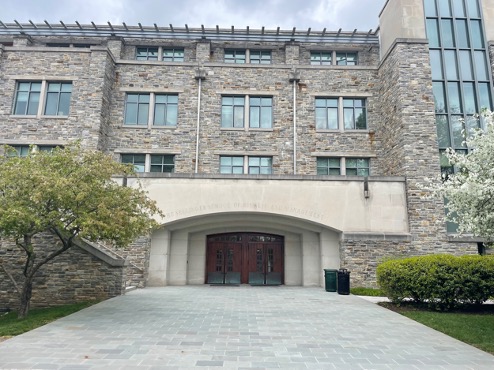More than 60 percent of Loyola’s students participate in the study abroad program. With 13 different programs to choose from, students over the years have had many new opportunities and experiences that are difficult to forget.
However, with these exciting experiences, there also comes the inevitability of returning home.
The re-entry process has been a challenge for students as they return home. While the familiarity of home is comforting to students, transitioning from life abroad to life back at Loyola comes with its own set of challenges.
Lyra Koncsol ‘24, who spent a year abroad in Newcastle, England, spoke about her experience with reentry.
“The hardest thing about coming home was feeling so underwhelmed by everything. I felt like I was going through days without actually experiencing them,” she said.
After returning home, many students grapple with these same feelings. Not only do students have to adjust to life back home, but readjusting to friendships and academic life is also a challenge.
“Getting back to Loyola after being gone for a year was really tough because I felt like I hadn’t seen anybody in so long and all my friendships felt distant… I felt like I was making friends again in a way because they had all lived these lives together while I was gone,” Koncsol said. “Their friendships with each other paused together. Mine didn’t.”
As students reenter the friendships they left in the States, they also must confront saying goodbye to deep friendships they made while abroad.
“I built a life and created a home for myself abroad, especially being gone for the year,” Koncsol said. “I miss my flatmates and my friend group every day… I felt more at home there than I ever did at Loyola, and I miss feeling so welcomed and loved and seen.”
A handful of Loyola’s students also feel the same way. In a survey spread to students who returned from abroad, similar experiences were shared.
Returning students raised issues such as lack of or unreliable public transportation, lack of walkability, readjusting to social norms in the U.S., the lack of multiculturalism, and adjusting to the different academic styles.
A common trend in the survey was that students found they had more free time abroad. Whether it was time to spend with friends or exploring, students expressed that free time was often part of the culture abroad in a way that is not included in American culture.
“I miss exploring the city with my friends. I feel like here at Loyola or even at home, you never get the time to go out and explore even your local area,” one survey answer said.
Students explained that while the return home was exciting and comforting, there was still something missing. Though they were happy to be back with their friends and family, it was a challenge to part with the deep connections they made abroad.
Loyola’s Study Abroad Program requires students to write periodic reflections throughout their time abroad. But after their final reflection, it is up to them to adjust to everything following their return. While this requires individual work on the students’ behalf, some expressed that returning back to campus was a harsh transition.
“There isn’t much in place I would say to help with reentry. They have us write a reflection essay but I don’t think it benefits us very much with adjustment,” a student shared in the survey.
Other students said that they felt it was not solely Loyola’s job to prepare students for the return home. However, others stated that they would have liked some form of preparation. Moving overseas already comes as a big adjustment for students, but the return home can also be jarring without the proper preparation.
Some students in the survey also offered advice that they would give future study abroad students, saying that it’s important to understand that there will be changes, but they can be positive. Koncsol also offered her own advice on how to cope with the transition.
“One tip I have would be to simply be patient… I tried to rush the transition and jump back into my normal routine. I needed time, and as time passed I was able to readjust and feel like I was back to a normal life again,” she said.
Students returning to Loyola are both relieved and comforted to be back on campus. But the memories, friendships, and opportunities from their time abroad can make the reentry process a struggle.
Students may find comfort in sharing their experiences with others that feel the same. While many memories of abroad are passed back and forth, it is also important to share the experience of reentry together.
If any student is struggling with returning from overseas, appointments with the Counseling Center are available from Monday to Friday, between 8:30 a.m. and 5 p.m.










































































































Nicholas Andrew Miller • Oct 6, 2023 at 11:13 am
As a faculty member and academic advisor, I frequently find that two things are especially apparent in my students who have recently returned from studying abroad: how much they have grown and matured, and how challenging reentry can be. I have always suspected the two are linked. Against the expansive backdrop of abroad experience, it’s hard to imagine coming home not feeling a bit constricted and constricting. Ms. Koncsol’s comment about “feeling so underwhelmed by everything…[and] going through days without actually experiencing them” is eloquent and illuminating. Thank you for shedding some light on this important and often neglected aspect of what students experience as part of their time studying abroad!